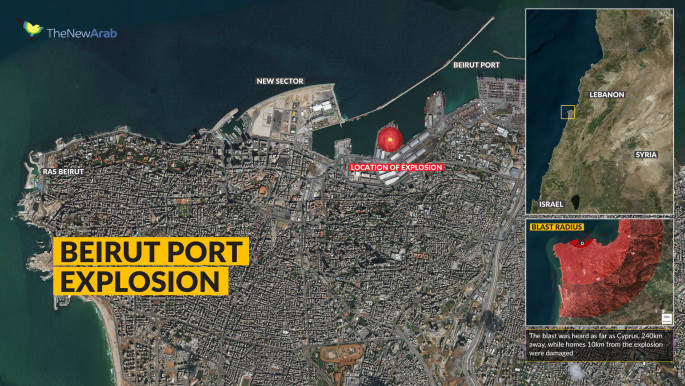Lebanon on verge of another garbage crisis, warns HRW
Lebanon on verge of another garbage crisis, warns HRW
Last month's explosion generated huge amounts of debris while causing serious damage to the Lebanon's waste management infrastructure
2 min read
Beirut's 4 August explosion caused a vast amount of rubble and debris [Getty]
Last month's explosion at the Port of Beirut threatens to unleash another garbage crisis on Lebanon, Human Rights Watch warned on Wednesday.
The blast, which killed 212 people and razed parts of the capital, produced an enormous volume of rubble and debris, while causing damage to two key waste management facilities in Karantina and Bourj Hammoud as well as waste collection vehicles.
A landfill at Bourj Hammoud - one of Beirut's two key garbage sites - is due to shut down this month after reaching full capacity.
The damage to the environmental sector wreaked by the blast has been estimated by the World Bank at between $20 million and $25 million.
"The problem is not new for Lebanon," said HRW, pointing out the garbage crisis that began in 2015 when the government closed the Naameh Landfill without providing an alternate site. It prompted rubbish to flood the streets of the capital.
Landfills Bourj Hammoud and Costa Brava were created as temporary sites to alleviate the crisis.
"Since then, the government has continued to rely – with limited success – on similar stopgap measures," said HRW. "Last year, garbage piled up on streets in northern Lebanon after an unregulated dumpsite was closed without an environmentally sound alternative. Earlier this summer, garbage again filled the streets of Beirut and surrounding areas."
Caretaker Prime Minister Hassan Diab - who has still not formed the emergency cabinet - held a meeting on Monday with President Michel Aoun and Environment Minister Damianos Kattar to address the waste crisis.
According to Lebanese media, one of the measures floated was to expand the Bourj Hammoud landfill, however this would only be a temporary fix.
"The costs of inaction in addressing Lebanon’s trash crisis are huge," warned the group. "Lebanon spends almost 10 times more on its waste sector than Jordan and Tunisia, but still fails to manage its garbage, thereby interfering with people’s right to health and a healthy environment."
HRW urged the country's next government to prioritise an integrated approach to waste management and decrease reliance on landfills.
"It is time that authorities solve this crisis once and for all," it said.
Follow us on Facebook, Twitter and Instagram to stay connected
A landfill at Bourj Hammoud - one of Beirut's two key garbage sites - is due to shut down this month after reaching full capacity.
The damage to the environmental sector wreaked by the blast has been estimated by the World Bank at between $20 million and $25 million.
"The problem is not new for Lebanon," said HRW, pointing out the garbage crisis that began in 2015 when the government closed the Naameh Landfill without providing an alternate site. It prompted rubbish to flood the streets of the capital.
Landfills Bourj Hammoud and Costa Brava were created as temporary sites to alleviate the crisis.
 |
|
| Click to enlarge |
"Since then, the government has continued to rely – with limited success – on similar stopgap measures," said HRW. "Last year, garbage piled up on streets in northern Lebanon after an unregulated dumpsite was closed without an environmentally sound alternative. Earlier this summer, garbage again filled the streets of Beirut and surrounding areas."
Caretaker Prime Minister Hassan Diab - who has still not formed the emergency cabinet - held a meeting on Monday with President Michel Aoun and Environment Minister Damianos Kattar to address the waste crisis.
According to Lebanese media, one of the measures floated was to expand the Bourj Hammoud landfill, however this would only be a temporary fix.
"The costs of inaction in addressing Lebanon’s trash crisis are huge," warned the group. "Lebanon spends almost 10 times more on its waste sector than Jordan and Tunisia, but still fails to manage its garbage, thereby interfering with people’s right to health and a healthy environment."
HRW urged the country's next government to prioritise an integrated approach to waste management and decrease reliance on landfills.
"It is time that authorities solve this crisis once and for all," it said.
Follow us on Facebook, Twitter and Instagram to stay connected

![Palestinians mourned the victims of an Israeli strike on Deir al-Balah [Getty]](/sites/default/files/styles/image_684x385/public/2024-11/GettyImages-2182362043.jpg?h=199d8c1f&itok=xSHZFbmc)


![The law could be enforced against teachers without prior notice [Getty]](/sites/default/files/styles/image_684x385/public/2178740715.jpeg?h=a5f2f23a&itok=hnqrCS4x)
 Follow the Middle East's top stories in English at The New Arab on Google News
Follow the Middle East's top stories in English at The New Arab on Google News

![Palestinian journalists in West Bank [Getty]](/sites/default/files/styles/image_330x185/public/2167088057.jpeg?h=a5f2f23a&itok=smdkN-46)
